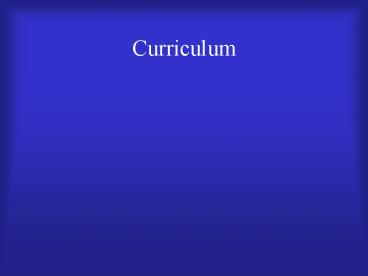Curriculum - PowerPoint PPT Presentation
1 / 23
Title:
Curriculum
Description:
Curriculum as a product (documents that state how & what) ... Instrumentalism. Progressivism. Reconstructionism. Issues. Compensation. Comprehensivisation ... – PowerPoint PPT presentation
Number of Views:86
Avg rating:3.0/5.0
Title: Curriculum
1
Curriculum
2
Objectives
To provide an overall view of key
issues Definition Concept Philosophy Ideology
Design (Models) Implementation
3
Activity
In groups, discuss and arrive at a definition of
Curriculum that suits
4
Definitions
Curriculum as defined by content (Syllabus)
Weakness What about how? (TL)
Curriculum as a product (documents that state how
what)
Weakness represents an ideal not necessarily the
actual curriculum
5
Definition
Curriculum is a set of performance objectives
Weakness Emphasis upon behavioural outcomes
Curriculum is an individuals learning experience
Weakness Brings into play the Hidden
Curriculum and associated dangers
6
Working Definitions
Walker (1990) Curriculum should address issues
such as Matters that students and tutors attend
together Issues that tutor/student recognise as
pertinent for study The manner in which these
issues are organised
7
Working Definitions
Marsh Willis (1994) Curriculum is an
interrelated set of plans and experiences which a
student completes under the guidance of the school
8
Marsh Willis
Plans
Experience
Student
School
9
The nature of curriculum
A Aims C Content M Methods E Evaluation
10
Curriculum Theory Practice
Theory
Concept
Curriculum Model
Practice
Feedback
11
Activity
Identify components that you think need to be
considered in terms of a structured curriculum
12
Walker (1990)
Content Topics/themes Purpose Intellectual
Social Personal Organization
Planning/sequencing
13
Walklin (1990)
- Identifying/analysing needs
- Aims/Objectives
- Course content
- Teaching/learning strategies
- Structuring TL programme
- Assessment
- Resources
- Curriculum evaluation procedures
14
Activity
Who is involved in the curriculum?
15
Curriculum Theory
Sociology of Curriculum
- Marxist
- Structural Functionalism
- Interactionism
16
Curriculum Theory Ideology
Definition of Ideology
A statement of beliefs and values which reflect
and justify your position in society and serve to
explain your actions
17
Armitage et al (1999)
Ideologies include assumptions about learning,
teaching and the nature of subject knowledge and
about how education and training are linked to
wider economic, political, moral and social
circumstances of the time
18
Barnes (1982)
No curriculum is neutral every curriculum is
imbued with values. These values embody a view of
the kind of people we wish our pupils to become
and of the kind of society that such people could
live in as Eisner (1969) once wrote when
discussing the idea of neutral curriculum
planning, under the rug of technique, there lies
an image of man.
Question What does he mean??
19
Ideology
Technocratic Education - Economy
Romantic Emphasis upon individual development
and realisation of potential (humanist)
20
Ideological Views
- Conservative
- Revisionist
- Liberal-humanists
- Instrumentalism
- Progressivism
- Reconstructionism
- Issues
- Compensation
- Comprehensivisation
- Egalitarianism
- Meritocracy
- Vocationalism
- Lifelong Learning
21
Factors Affecting Curriculum
Activity
List factors that affect curriculum
22
Factors
Social Class Teaching fashions Examination
Boards Societal values/morals Government Intere
st groups College organisation Content of
texts Technology Student perceptions/needs Poli
tics responses Parents Industry
23
FIN































